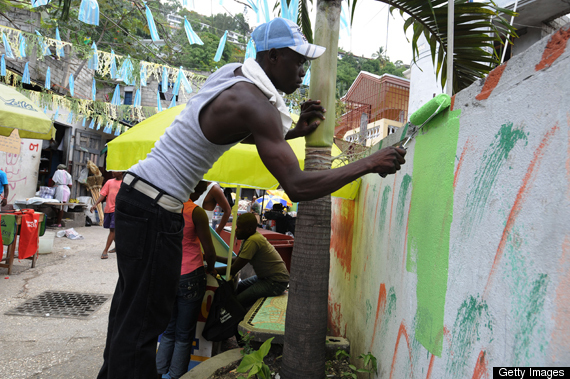 I was scheduled to travel to Haiti early in the year to visit Concern's USAID funded Child Survival Program, but the Jan. 12 earthquake changed all that. I finally arrived in Port-au-Prince May 24 after my flight the day before had been canceled. I began to wonder if I would never get there.
I was scheduled to travel to Haiti early in the year to visit Concern's USAID funded Child Survival Program, but the Jan. 12 earthquake changed all that. I finally arrived in Port-au-Prince May 24 after my flight the day before had been canceled. I began to wonder if I would never get there.
My first impression is that Haiti seems, on the surface at least, similar to West Africa. There is such vibrancy here and resilience among the people -- but, just under the surface, there must also be a lot of pain and loss. That was evident as I visited the neighborhoods where the Child Survival Program is still functioning to some extent.
I visited the community center near the rubble in St Martin, hidden among many of the buildings still standing, where new mothers meet to discuss their health concerns, as well as encourage and support each other during this challenging time.
I saw more evidence of the impact of the quake at the University Hospital, were newborns were being treated in critical care units where some mothers abandoned their children because they could no longer care for them. I saw the impact of the earthquake in the baby boy with HIV who would recover fully from malnutrition, and in the last few breaths of a newborn who was brought to the center too late--and in the lines of mothers with babies and children stretched along the main road leading up to the hospital and in the tents where dozens of children and infants were being treated.
I observed Concern's peer training initiative, in which Concern mobilizes experienced mothers to explain the importance of breastfeeding, vaccination, and preventing diseases such as malaria and diarrhea to new mothers. It was great to see the interest of so many mothers involved in this process. The room was packed and the spirit was high -- despite the bleak surroundings of rubble and debris.
The political climate is highly charged and one can read (in French) the many graffiti slogans for and against the government. There were organized demonstrations full of chanting and music similar to a New Orleans second-line parade. Along the roadways, there are numerous makeshift settlements, some consisting of 6-10 tents and others too numerous to count. Yet, to my surprise, most of the city is intact and functioning as if things were normal; bright colorful murals are a reminder of days not so long ago.
Haiti has never been a country without difficulty, and now that is even more evident. But, at the same time, more help has arrived. However, many of the victims are cut off from help. They still go without regular meals and shelter, because they have no job and their relatives' homes have also been destroyed. What happens to them? What happens when the emergency response concludes? What happens when the next big hurricane arrives?
The rains have started -- and the weather forecast for the upcoming hurricane season is similar to 2005 when Hurricane Katrina hit New Orleans. People are very worried about how the rains will affect their lean-to and tent shelters, many of which are on the sides of slopes and in ravines between hills and mountains. The rain can make everything fresh and cool--and relief from temperatures in the 90s with 90 percent humidity -- but mosquito bites are reminders of dangers just lurking under the surface in the form of malaria and dengue fever.
My time in Haiti is too short for me to even begin to grasp the enormity and complexity of the situation. But later in the summer I will return to assist with the final evaluation of the Child Survival Program and in making plans for next steps -- doing what I can to bring some routine and steadiness to a city still in flux five months after nature's wrath.
